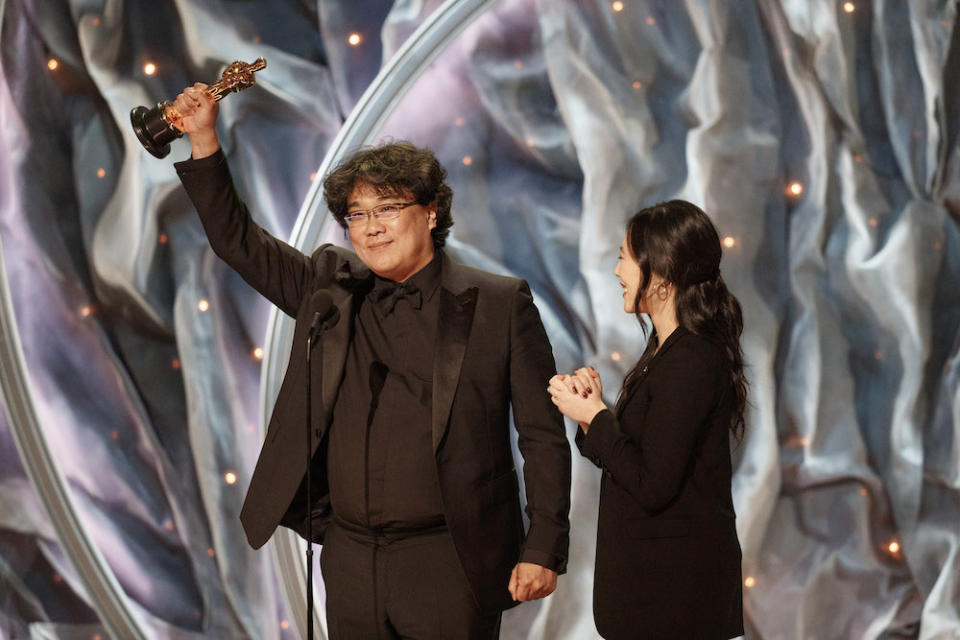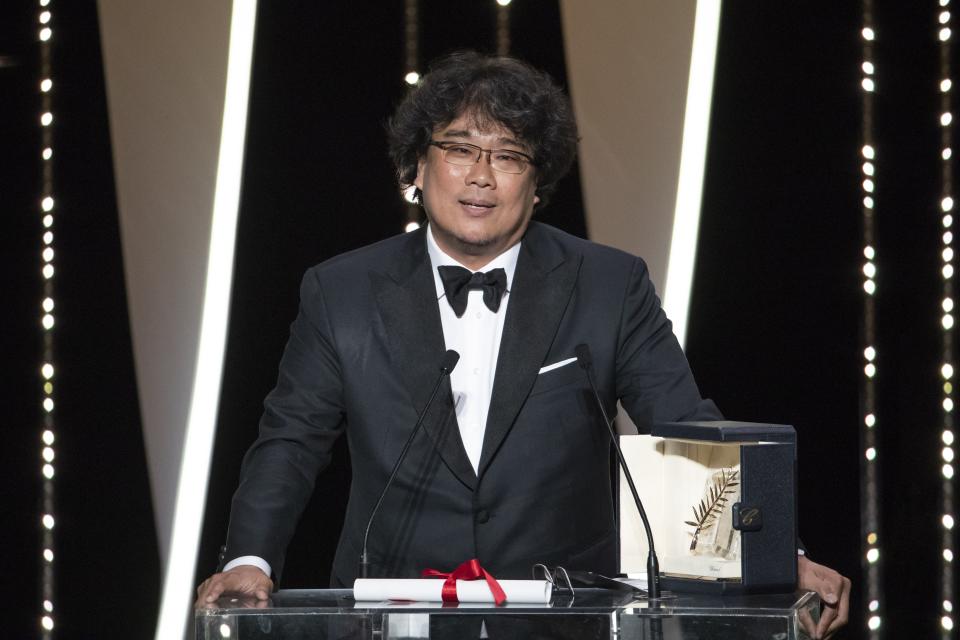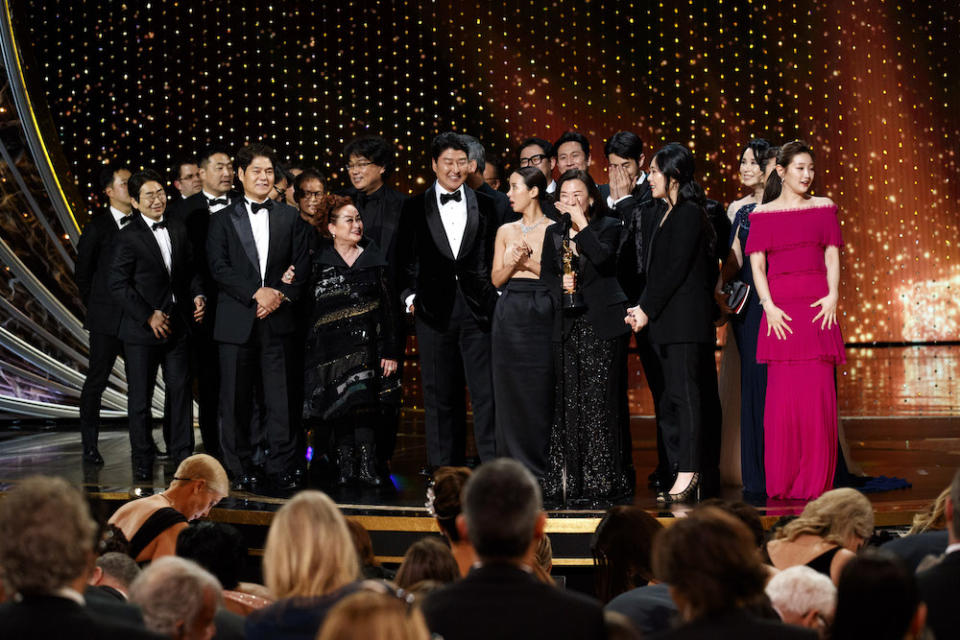Inside the Oscars Ceremony, Where the Academy Needed ‘Parasite’ More than ‘Parasite’ Needed It

- Oops!Something went wrong.Please try again later.
- Oops!Something went wrong.Please try again later.
Bong Joon Ho was standing inside the nascent Academy Museum, a 50,000 square-foot assemblage of cavernous rooms yet to be filled with Hollywood exhibitions, and he was contemplating the mayhem of awards season. It was two days before the Oscar ceremony, but the Korean director has been in promotional mode since “Parasite” won the Palme d’Or in May. A genial, soft-spoken creative now elevated to pop-star status, he leaned in and smiled as nominees in the Best International Film category made their way to the stage for remarks at the official Academy cocktail party.
“I get it now,” Bong said. “I get how this whole system works.” He shrugged. But was that good or bad? “I think … it’s both,” he replied, then sped off to the front of the room on cue, smiling for another set of cameras.
More from IndieWire
Only American Films Should Win the Best Picture Oscar, Says Cannes Head Thierry Frémaux
Chris Rock Calls Oscars 'F*cking A**holes' for Snubbing Adam Sandler
Forty-eight hours later, Bong’s long-term investment came to fruition in the most exciting, unorthodox series of Oscar wins in recent memory. As Bong picked up four trophies, “Parasite” went from being the first Korean feature nominated for any Oscars to a historic Best Picture win, the first for any non-English language movie in the Academy’s 92 years.
The “Parasite” wins injected the ceremony with bursts of emotion and cultural significance. It holds tremendous value for the foreign-language market in the U.S., and for Korean cinema in particular. But as the Oscars have opened up to the world, is the world truly opening up to the Oscars?

ABC / CRAIG SJODIN
Hollywood is an industry that welcomes outsiders. Since 2010, nine of the 10 Best Director wins went to filmmakers from other countries. The 2020 outcome follows last year’s aggressive Netflix campaign for Alfonso Cuarón’s “Roma,” though Cuarón was already an established Hollywood presence when he made his delicate Mexican drama. Bong, by contrast, spent the past two decades rising in stature on the festival circuit and accruing a cult following in the U.S. To win the Academy’s approval, he had to put himself at the center of the machine.
At the urging of his distributor, Bong moved to Los Angeles in early January with his wife and son, mitigating the campaign-season challenge of flying out from Korea whenever an event called for it. (He initially wanted to bring the family dog, too, but eventually nixed the idea.) He managed to keep working on a range of new projects, but even the purest artist has to cosplay politician on the awards trail.
The journey of the international Oscar campaigner can be a strange, alienating experience. For all the noise they must endure, candidates often contend with strange moments of solitude, caught in a cultural disconnect and the need to perform.
That phenomenon was especially pronounced this year with foreign-language films scoring nominations across seven categories, from Best Picture and Best Documentary to Best Actor (lest we forget the long-overdue first nomination for “Pain and Glory” star Antonio Banderas). No longer the Best Foreign Language Film, the Best International Film category continued to highlight the disconnect as the Best Picture win for “Parasite” rendered the category redundant. Why celebrate the best international film when the Oscars could be dominated by them, anyway?
Nevertheless, the Academy’s Best International Feature branch worked overtime to comb through its options for that category. In previous years, the shortlist gave Academy members nine titles to vote on for a five-film category; for the first time this year, the Best International Feature Committee pushed the list to 10 and opened the voting process to all Academy members who watched the films.

Neon
As the party circuit intensified throughout the weekend, its international visitors stood out in contrast to the famous faces. At the annual Women in Film gathering at the Sunset Room, “Honeyland” filmmakers Tamara Kotevska and Ljubomir Stefanov joined their subject, Haditze Muratova, who lives a rural existence cultivating honey in a remote mountainous region. Nearby was the heroic Dr. Amani Ballour, a Syrian refugee who spends the bulk of “The Cave” running an underground hospital as bombs drop from above. Brazilian documentarian Petra Costa mused on how her nominated “The Edge of Democracy” stirred up conversations about the country’s fascist inclinations.
Meanwhile, the clock kept ticking for Bong. At a Friday night party for “Parasite” hosted by Vanity Fair, a Neon staffer asked him how he was holding up. He flashed one of his unassuming smiles. “It’s almost fucking over,” he said.
When “Parasite” won the Palme d’Or, Bong never could have anticipated the commitment to come. This year, attendees should consider themselves warned: There were 22 nominations this year for Cannes premieres (and only one title, Quentin Tarantino’s “Once Upon a Time in Hollywood,” hailed from the U.S.). The festival’s long-term overseer, artistic director Thierry Fremaux, has mixed feelings about that development. Noting the national focus of other country’s ceremonies — Spain has the Goyas, France has the Cesars — he wondered if the Oscars should consider a similar approach. “Maybe it would be good,” he said, “for America to celebrate its own cinema.”

SYSPEO/SIPA/Shutterstock
At the Spirit Awards, the “Honeyland” co-directors hovered on the outskirts of the crowd as Stefanov lit up a cigarette outside the giant white tent. He was already resigned to losing. “You know, we were sitting over the last few days with the other nominees, more experienced guys like Pedro, and I don’t like these things,” he said, and exhaled. “I want to be able to work on other projects. I love spending time with other filmmakers, but not at all these fancy cocktails for two weeks in a row. Come on! It’s too much!” A few hours later, Bong won the foreign language film prize in anticipation of his Sunday victory. “After tomorrow, I can finally go home,” he told journalists backstage. “That’s what makes me happiest.”
But the Spirit Awards provided a very different reminder that the concept of “foreign-language film” may be losing its currency. Best Film winner “The Farewell,” a movie shot largely in China with Mandarin dialogue, scored the biggest victory of the day. In her rousing speech, Wang expressed a desire “to show a different side of what an American family looks like.”

MediaPunch/Shutterstock
Backstage, as Wang and her team toasted the victory, producer Andrew Milano chatted about the process that allowed “The Farewell” to escape any kind of foreign designation. “Here’s the funny thing,” he said. “The script was in English until we got close to really making it. So to be honest, we knew that it’d be in Chinese, but in a way, the fact that it started in English was a big deal because when I read it, I read it as an American movie.”
The next day at the Oscar ceremony, industry figures milled about on the red carpet before the show, buzzing about the potential of a “Parasite” victory and the wider presence of foreign-language cinema among the nominees. Early in the night, the movie revealed its momentum with an Original Screenplay win. Trevor Groth, the former Sundance programming director who works at Neon owner 30WEST, celebrated at the bar. “You know what’s good about this?” he beamed. “Looking ahead.” 30WEST and Neon staffers were seemingly everywhere in the Dolby, contemplating the film’s imminent victory and its pervasive success. In the lobby, Neon co-founder Tim League recalled his first nomination for the Belgian thriller “Bullhead” at now-defunct Drafthouse Films. (It lost.) “Hopefully now there will be a ripple effect,” he said, “where international film isn’t stigmatized.”

ABC / Craig SJODIN
The energy in the room as “Parasite” won one award after another suggested, at least for the evening, that was the case. Upstairs at the Governors Ball after the show, Sony Pictures Classics co-president Michael Barker mused on the outcome. His company led the charge for years on foreign-language crossover hits, including previous Best Picture nominees “Crouching Tiger, Hidden Dragon” and “Amour.” With “Parasite,” Barker said, the outcome spoke less to cultural process than the specific escapism of the movie in question. “It’s not even a foreign film, not really,” he said. “It’s a genre film, like ‘Get Out.’” He rebuffed the notion of a foreign-language boom. “It’s not about jacking up prices for foreign films,” he said. “We have to lift up the little ones. Every film is different.”
At the “Parasite” after party at Soho House, partygoers noshed on Korean food and bopped their heads to K-pop. Fremaux milled about and admitted that his perspective had evolved since the previous night. “I think it’s a good thing, actually,” he said. “The Oscar and Cannes can fight for cinema — together!” In another room, an ebullient Neon staffer hinted at the future as the “Parasite” team arrived with Oscars in hand. “Well, shit, it broke all the rules,” he said. “Now everyone’s gonna go to Cannes with their pocketbooks open!”
Meanwhile, Bong blew off the Vanity Fair after party to hold a press conference for Korean media, where it was already well into the next day. He already had plans to escape the campaign mayhem; on February 12, he’ll be at the Walker Arts Center in Minneapolis for a public discussion of his work with film critic-turned-Amazon-executive Scott Foundas.
As he breezed into Soho House, Bong spotted “Portrait of a Lady on Fire” director Celine Sciamma, who was snubbed by the Oscars but came to town for her single Spirit Award nomination. He handed her his Best International Feature statue. “You should be holding this,” he said. The DJ turned up “Hits From the Bong” as the filmmaker slid into a mosh pit of Korean peers, programmers, and marketing executives, most of whom work far from traditional Hollywood.
Bong made his way to the corner, juggling an Oscar in one hand and a beer in the other. “Give him space!” someone shouted. He spent the next hour picking up and putting down both objects as well-wishers continued coming his way. Shortly after 1 a.m., the Bongtourage headed for the exit, as partiers speculated about after-party plans at a karaoke bar in Koreatown. But just as quickly came word that this one bash was off-limits to anyone beyond the filmmaker’s inner circle. Bong had left the building and returned to his world.
Best of IndieWire
Sign up for Indiewire's Newsletter. For the latest news, follow us on Facebook, Twitter, and Instagram.

